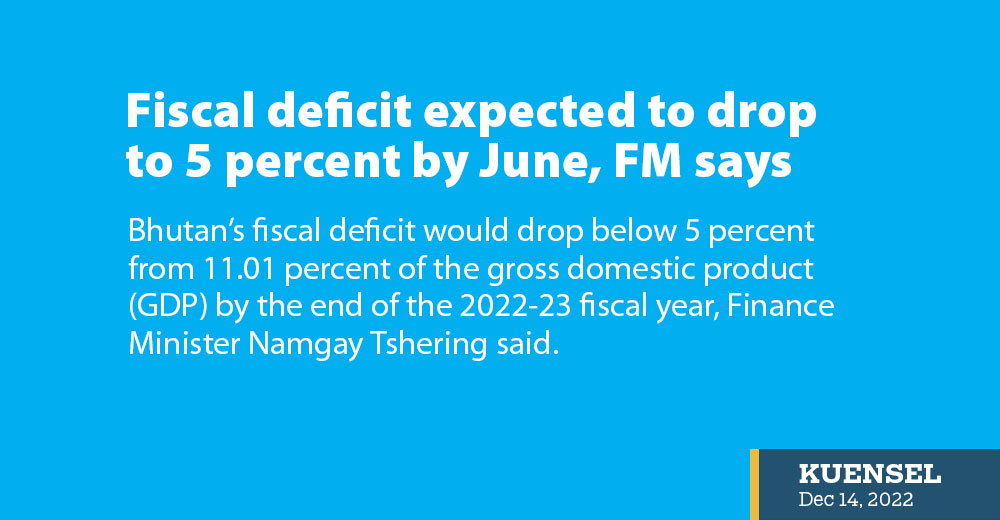… it is at 11.01 percent of the GDP now
Thukten Zangpo
Bhutan’s fiscal deficit would drop below 5 percent from 11.01 percent of the gross domestic product (GDP) by the end of the 2022-23 fiscal year, Finance Minister Namgay Tshering said.
This means that the fiscal deficit will narrow below Nu 10.4 billion (B) from this year September’s fiscal deficit of Nu 22.89B.
A fiscal deficit arises when the government expenditure exceeds its revenue and it needs to be filled with borrowings.
In this fiscal year, the total revised expenditure was Nu 76.75B while the total approved budget was Nu 74.81B as of September this year. The capital expenditure was revised to Nu 40.31B from the approved Nu 38.47B, an increase of about 5 percent.
The total resources in the fiscal year was revised to Nu 53.86B from the approved resources of Nu 51.93B.
The Royal Audit Authority has been alarming the country about rising fiscal deficits.
Four years ago in the 2018-19 fiscal year, the fiscal deficit was only about Nu 2.7B or 1.5 percent of the GDP. This means that the fiscal deficit has increased by over 700 percent.
The fiscal deficit has constantly increased over the years from Nu 3.39B in the fiscal year 2019-20 and Nu 11.14B in the fiscal year 2020-21 to Nu 14.57B in the fiscal year 2021-22, which could be attributed to limited revenue growth and increased public spending.

Finance Minister Namgay Tshering said that a fiscal deficit exists when there is more budget allocated for capital expenditure.
In the last two fiscal years (2020-21 and 2021-22), Lyonpo said that the government apportioned more capital expenditures to pump the economy as an expansionary fiscal policy to boost consumption and bring the economy on track. The country’s GDP contracted to -10.08 percent in 2020 during the pandemic. The government’s spending contributes almost 38 percent of the GDP.
Lyonpo said that the frontloading of grants for the 12th five-year plan in the last two fiscal years has increased the fiscal deficit to Nu 22.89B in this last fiscal year.
To finance the fiscal gap, he said that the government would fill up through domestic and external commercial borrowings and grants.
However, Lyonpo said the government would not take expansionary fiscal measures. “The new constructions of offices that have to spend from the capital expenditure have been put on halt unless there are contractual obligations.”
He added that if we go with the new constructions since we have to depend on the raw materials through import, it would drain foreign currency reserves. “With inflation of 8 percent, we are also not achieving the best cost-benefit.”
Lyonpo also said that the ministry is constantly tracking and monitoring the expenditures and budget releases to spend judiciously.
The burgeoning fiscal deficit is expected to increase public debt. The government has projected the public debt at 131.1 percent of the GDP in this fiscal year.
As of September this year, the external debt constituted 89.3 percent (Nu 229.43B) of the total public debt accounting for 111.1 percent of the estimated GDP.
This year’s audit report also highlighted the rush of capital expenditure towards the last quarter of the financial year in the last three consecutive years.
Lyonpo said that such rush practices were happening in the past. “However, the ministry has corrected it as it now releases the budget only upon the release request with the implementation plan.”


